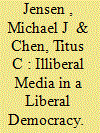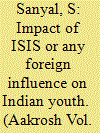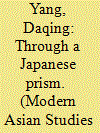|
|
|
Sort Order |
|
|
|
Items / Page
|
|
|
|
|
|
|
| Srl | Item |
| 1 |
ID:
095104


|
|
|
| 2 |
ID:
180527


|
|
|
|
|
| Summary/Abstract |
The regime of censorship in the People’s Republic of China (PRC) extends beyond its borders through the extraterritorial application of its media regulations to popular social media platforms like WeChat. This research investigates the effects of the PRC’s extraterritorial control of online content on the identity narratives and norms communicated by comparing Australia’s Special Broadcast Service (SBS) Mandarin language news and the news targeting Australian audiences published on popular WeChat Official Accounts (OAs). We find significant differences in the news content between these two platforms: SBS provides more political content and a focus on political and cultural integration, while WeChat pages tend to avoid political topics that are not otherwise press releases from the PRC and they encourage strong cultural ties with Mainland China. Finally, SBS tends to both inform and cultivate democratic political identities and identification with the Australian political system, whereas WeChat tends to differentiate the Chinese diaspora from the wider Australian community. We situate these findings within a wider understanding of PRC’s national security strategies and doctrine. Whether by requirement or practice, not only the WeChat OAs in Australia implement PRC’s communication controls, but the content on these pages also challenges the liberal democratic practices and norms and supports foreign influence and espionage in Australia.
|
|
|
|
|
|
|
|
|
|
|
|
|
|
|
|
| 3 |
ID:
139662


|
|
|
| 4 |
ID:
192879


|
|
|
|
|
| Summary/Abstract |
This article introduces a dataset on the covert use of social media to influence politics by promoting propaganda, advocating controversial viewpoints, and spreading disinformation. Influence efforts (IEs) are defined as: (i) coordinated campaigns by a state, or the ruling party in an autocracy, to impact one or more specific aspects of politics at home or in another state, (ii) through media channels, including social media, by (iii) producing content designed to appear indigenous to the target state. Our data draw on more than 1,000 media reports and 500 research articles/reports to identify IEs, track their progress, and classify their features. The data cover 78 foreign influence efforts (FIEs) and 25 domestic influence efforts (DIEs) – in which governments targeted their own citizens – against 51 different countries from 2011 through early 2021. The Influence Effort dataset measures covert information campaigns by state actors, facilitating research on contemporary statecraft.
|
|
|
|
|
|
|
|
|
|
|
|
|
|
|
|
| 5 |
ID:
139690


|
|
|
|
|
| Summary/Abstract |
This paper examines the key modern infrastructure of telecommunications in early Republican China, through the eyes of a Japanese, Nakayama Ryûji, who served as a telecommunications adviser to the Chinese government from 1913 to 1928. Nakayama's numerous reports and recommendations to his Chinese employer and frequent confidential dispatches to the Japanese government, when read together, constitute a fascinating prism. They not only reveal problems as well as the potential in China's telecommunications sector, they also highlight Japan's efforts to compete with other foreign actors in China through the provision of Japanese equipment, expertise, and loans. While Nakayama strove to shape China's telecommunications development in ways that would, in his view, benefit both China and Japan, his efforts were often undercut by the aggressive actions of the Japanese government in China, such as the infamous Twenty-One Demands. Though promising at first, Japan's influence on China's modernization in the early Republican era came to be more limited, especially when compared with the final decade of the Qing Dynasty. Ultimately, what can be seen through this Japanese prism confirms that the development of an information infrastructure in modern China, as elsewhere, was as much shaped by technological and economic forces as it was influenced by political and diplomatic factors.
|
|
|
|
|
|
|
|
|
|
|
|
|
|
|
|
|
|
|
|
|